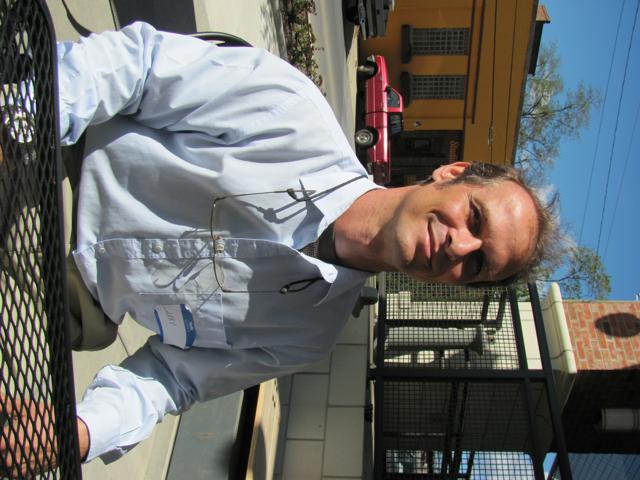- Making connections: South French Broad resident Larry Funk has completed LEED green associate training. He hopes a temporary job as a solar-power field technician will turn into a permanent one. photos by Tracy Rose
- Hiring local: Tim Alexander, president of HomeSource Builders in Asheville, thinks the Green Jobs program will be an “exceptional resource” for finding local employees.
- Thinking positive: Southside resident Candaus Richardson completed weatherization training through ABCCM’s Green Jobs program and is interested in the solar-power industry. He’s currently working part time at Rosetta’s Kitchen in Asheville.
As a local program that trains workers for green jobs winds down, staff and graduates alike confront a frustrating situation.
“As far as finding training-related work, that’s the challenge,” says Susan Garrett, Green Jobs director for the Asheville Buncombe Community Christian Ministry.
The ABCCM Green Jobs program began nearly two years ago when the nonprofit received an $880,000 federal stimulus grant to train disadvantaged workers for jobs in the energy-efficiency and renewable-energy sectors.
Garrett was hired in March 2010, and training began that July. Since then, she reports, 52 people have been trained as biofuels technicians, 24 as solar-thermal installers, 38 as LEED green associates specializing in green-building practices, and 156 as weatherization technicians.
To date, however, only 60 of those 270 people have found green employment; another 51 have found other jobs, Garrett reports, noting that roughly 30 to 40 percent of those placements have been for part-time work.
A similar story has played out nationwide. Of the of 3,586 people who completed green-jobs training funded by the 2009 Recovery Act, as of Sept. 30, 2010, only 466 found new jobs, according to a February report by the BlueGreen Alliance and the Economic Policy Institute.
“Now we’ve got all these wonderful trained people, but the market never materialized,” says Garrett.
She blames a still-weak economy in which many homeowners aren’t willing to pay for energy-saving improvements even if it would benefit their household’s bottom line while reducing the structure’s carbon footprint.
A companion program was supposed to spur spending by providing rebates for such improvements. But President Barack Obama’s $6.6 billion “Cash for Caulkers” program (aka Home Star) has yet to gain Senate approval.
Raising awareness
Against that background, ABCCM has resorted to a two-pronged approach to drumming up jobs for program graduates: networking with employers and seeking out grants.
“We’ve really tried to raise awareness that we have all these trained people,” Garrett says, telling potential employers “We’re your talent scouts: We can recruit good people for you.”
Last month, the nonprofit hosted a “meet and greet” for employers and program grads at The Magnetic Field in the River Arts District. Among the roughly 30 people who attended was Tim Alexander, president of the Asheville-based HomeSource Builders.
“I’m feeling like this will be an exceptional resource for me to have, to be introduced to a pool of people that can participate and help us in our construction,” said Alexander. “I’d like to try to support the local labor force, as opposed to bringing in folks from out of town, whenever possible.”
That’s music to the ears of program graduate Larry Funk, who’s worked in construction for years but needed to be “re-educated” after business dwindled for his tile-installation company, Dynamic Chai Standard. Funk had already received solar-energy training through Appalachian State University, so this time he opted for LEED green associate training.
In the meantime, Garrett was collaborating with the Blue Ridge Sustainability Institute, which received a grant to install solar panels on eight Asheville restaurants. Sundance Power Systems of Weaverville will do the work, and Funk is one of two Green Jobs graduates hired under the grant.
Garrett is also trying to tap into the Tennessee Valley Authority’s Clean Air Act settlement to fund a local version of the stalled federal Home Star program, creating a revolving-loan program that would help homeowners pay for energy-efficiency upgrades.
“Nobody expected the economy to take the hit that it has,” Garrett reflects. “I think just like with everything, we want to approach this with a can-do attitude.”
— Freelance writer and editor Tracy Rose lives in Asheville.






Before you comment
The comments section is here to provide a platform for civil dialogue on the issues we face together as a local community. Xpress is committed to offering this platform for all voices, but when the tone of the discussion gets nasty or strays off topic, we believe many people choose not to participate. Xpress editors are determined to moderate comments to ensure a constructive interchange is maintained. All comments judged not to be in keeping with the spirit of civil discourse will be removed and repeat violators will be banned. See here for our terms of service. Thank you for being part of this effort to promote respectful discussion.